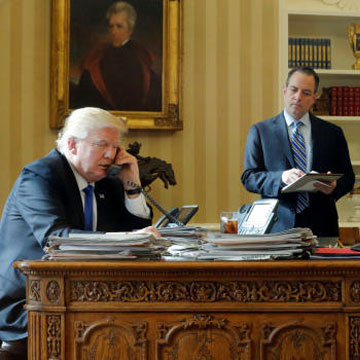 Washington
Washington: The Trump administration has alleged that top Indian IT firms TCS and Infosys have used unfair means to corner the lion's share of H-1B visas by putting extra tickets in the lottery system. However, the Trump administration wants to replace the matter with a more merit-based immigration policy.
The White House statement last week read that a small number of giant outsourcing firms have dropped more applications which naturally sharpen their chances of success in the lottery draw.
“You may know their names well, but like the top recipients of the H-1B visa are companies like Tata, Infosys, Cognizant — they will apply for a very large number of visas, more than they get, by putting extra tickets in the lottery raffle, if you will, and then they’ll get the lion’s share of visas,” the senior official said, according to transcript of the briefing posted on White House website.
“And those three companies are companies that have an average wage for H-1B visas between USD 60,000 and USD 65,000 (a year). By contrast, the median Silicon Valley software engineer’s wage is probably around USD 150,000,” a White House official said, adding that “And that’s all public record.”
However, all the three Indian firms declined to reply on the US administration’s comment. Presently, H-1B visas were awarded through random lottery with about 80 per cent of the workers are being paid less than their average in their respective fields.
“Only about 5 to 6 per cent, depending on the year, of H-1B workers command the highest wage tier recognised by the Department of Labour, there being four wage tiers. And the highest wage tier, for instance, in 2015, was only 5 per cent of H1B workers,” the official said.
He said workers are often brought in well below market rates to replace American workers. “Instead you’re bringing in a lot of times workers who are actually less skilled and lower paid than the workers that they’re replacing,” he said.
With the current system it will become extremely difficult to use visa to replace or chalk out American workers, he said. “Because you’re not bringing in workers at beneath the market wage. And so it’s a very elegant way of solving very systemic problems in the H-1B guest worker visa,” he said.
 Washington: The Trump administration has alleged that top Indian IT firms TCS and Infosys have used unfair means to corner the lion's share of H-1B visas by putting extra tickets in the lottery system. However, the Trump administration wants to replace the matter with a more merit-based immigration policy.
Washington: The Trump administration has alleged that top Indian IT firms TCS and Infosys have used unfair means to corner the lion's share of H-1B visas by putting extra tickets in the lottery system. However, the Trump administration wants to replace the matter with a more merit-based immigration policy. 